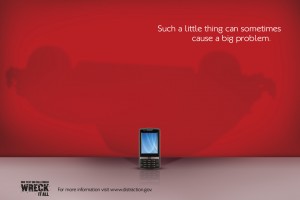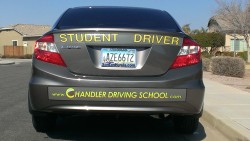April is National Distracted Driving Awareness Month. Be a part of the solution to this ever growing problem.

According to the preliminary data provided by GHSA (Governor’s Highway Safety Association), the number of teens involved in car accidents is expected to increase this year. This would make 2012 the second year in a row that the numbers have gone up. There are ways, however, to promote safe driving practices.
Safe driving practices are the responsibility of all drivers. This includes everyone from the novice who is just learning, to the beginner who just got their driver’s license, to the most experienced.
When it comes to teens driving, we recommend a parent/teen contract be used the day a new driver earns their driver’s license. This agreement would help to lay out the rules, so that there are no questions about what is expected, and what the consequences are for not staying within the family rules. The contract we give our driving families includes things like seat belts, texting, alcohol use, passengers, and curfews.
Be a good example by not turning on the car until everyone has “clicked” in their seatbelt. Also, never use your cell phone when driving. Remember that your family will, most likely, learn from your example.
Bring up safe driving topics at dinner, or other quiet times when the family is together. Remind them that there are natural consequences to not obeying the law and that you understand that there are a lot of other things that their mind might be on, but that safety has to be a priority when they get behind the wheel, because you love them.
Remind your teen that nothing texted can be worth risking their safety, and the safety of the others on the road. The job at hand is to get from point A to point B. A good practice is to leave the phone in the glove box, or back seat. Have them let their friends know that they will be out of reach until they have completed their journey. Remind your teen that their friends will understand, because they probably care about them too.
Finally, reinforce good choices. Acknowledgement goes a long way. Simply saying “thank you for not using your cell phone”, when the driver has a choice to answer a call or a text, may be just the reminder that they need. For more details and statistics, please visit: www.distraction.gov
Please join us in putting an end to distracted driving, by spreading the word that “One text or call could wreck it all”.


